The ancient Chinese art of Feng Shui helps create a peaceful outdoor space. It offers insights and practical tips. By applying Feng Shui, your garden can be both beautiful and balanced.
Feng Shui aims to blend nature with built spaces. It focuses on energy flow, or “chi,” and element placement. This creates harmony and well-being in your garden.
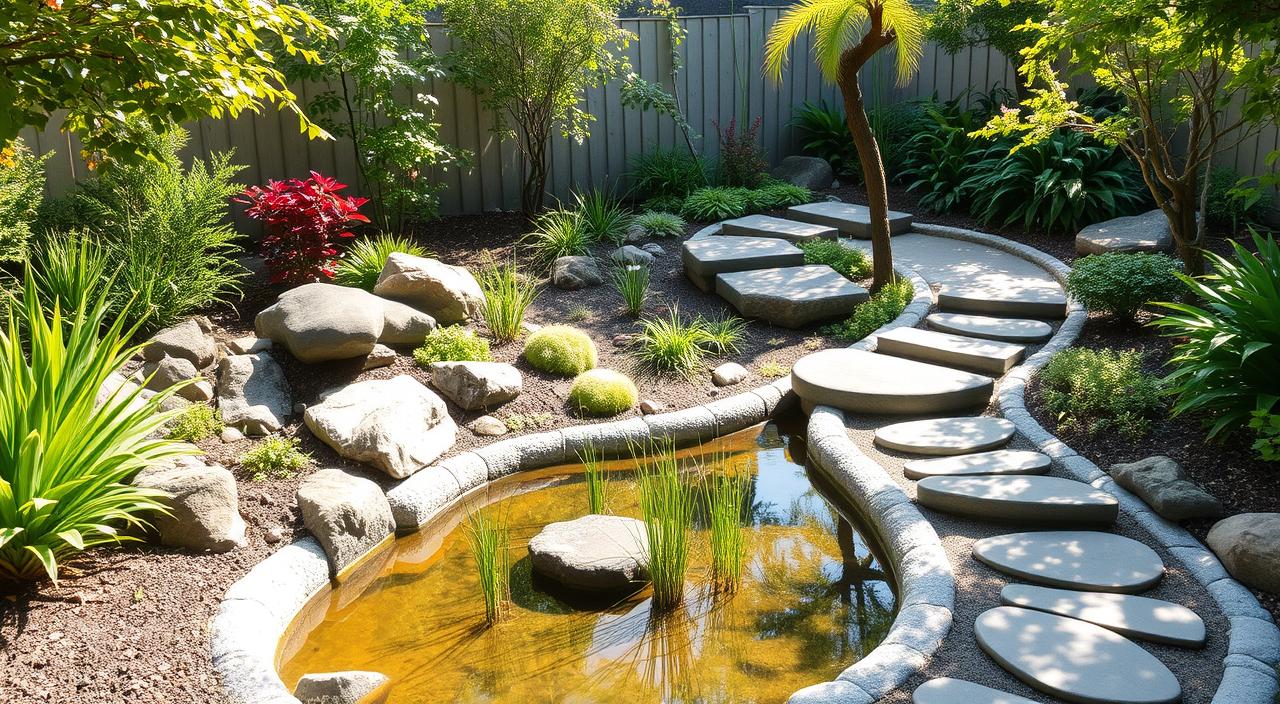
Key Takeaways
- Incorporate curved features and natural borders to enhance the flow of positive energy.
- Strategically place seating areas to boost relationships and encourage prosperity.
- Create distinct zones in your garden for various activities to promote energy balance.
- Incorporate Feng Shui-friendly plants and water features to attract positive chi.
- Utilize the five Feng Shui elements – water, wood, fire, earth, and metal – to create a harmonious environment.
What is Feng Shui and the Five Elements?
Feng Shui is an ancient Chinese art that aims to harmonize spaces with nature. It balances the five elements – water, wood, fire, earth, and metal – for peace and tranquility. Using these elements in a garden is key to Feng Shui.
Balancing the Five Elements
The five elements of Feng Shui – water, wood, fire, earth, and metal – each have unique energies. To make a harmonious garden, balancing these elements is crucial:
- Water is best for the North quadrant, symbolizing career and wealth.
- Earth elements, like boulders and stone paths, should be in the Southwest and Northeast. They bring security and stability.
- Metal elements, such as a rusted steel sphere, are good for the West and Northwest. They bring calm energy and luck.
- Wood elements, like wooden furniture or decorative gates, are great for the East and Southeast. They attract health and wealth.
- Fire elements, including fire pits or bright red hues, are suggested for the South. They represent passion and fame.
By carefully adding these five elements, you can make a Feng Shui-inspired garden. It will promote balance and harmony.
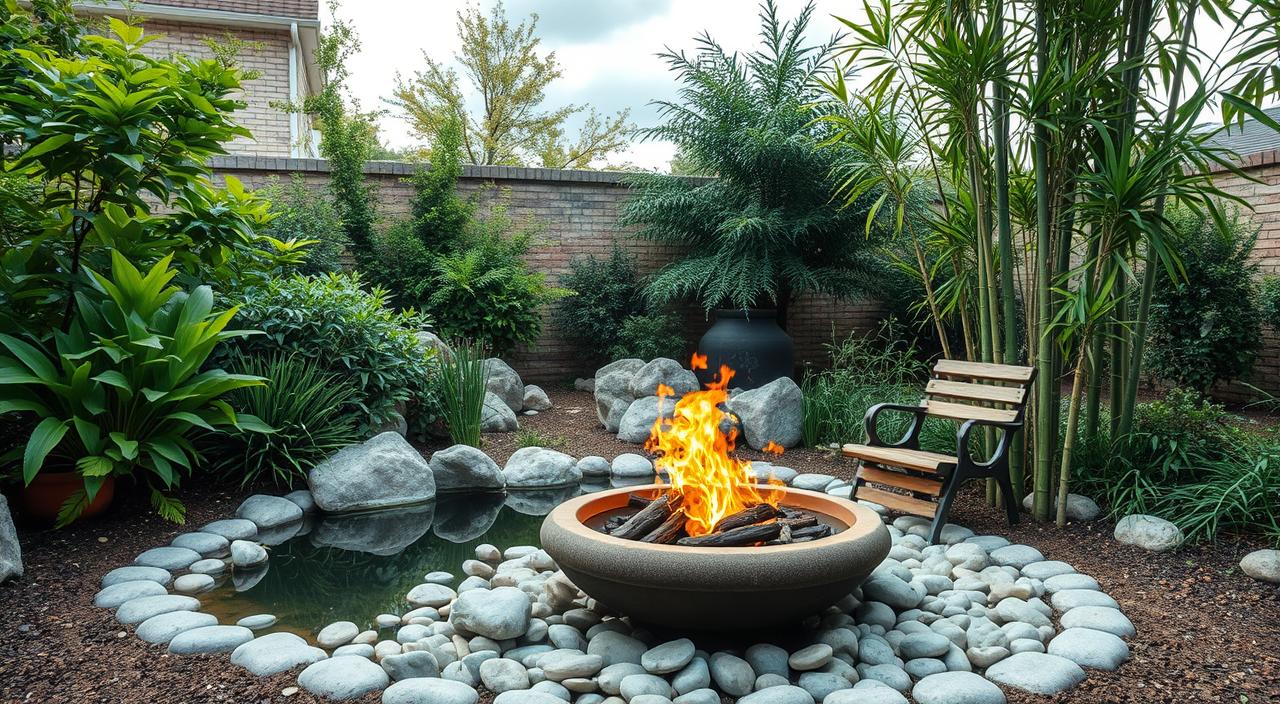
Avoid Sharp Corners and Create Curved Lines
Feng Shui teaches us to stay away from sharp corners. They are thought to block good energy. Instead, use curved shapes in your garden to make it calm and peaceful. Curves, like in paths and water features, help energy flow well.
Adding the five elements (wood, fire, earth, metal, and water) to your garden is key. Mix different plants to improve energy flow. Wind chimes also bring in the wind element, adding to the positive vibes.
By making your garden curved and avoiding sharp corners, you create a peaceful place. This simple change can make your outdoor area feel more balanced and calm. It’s a great way to improve your garden’s energy.
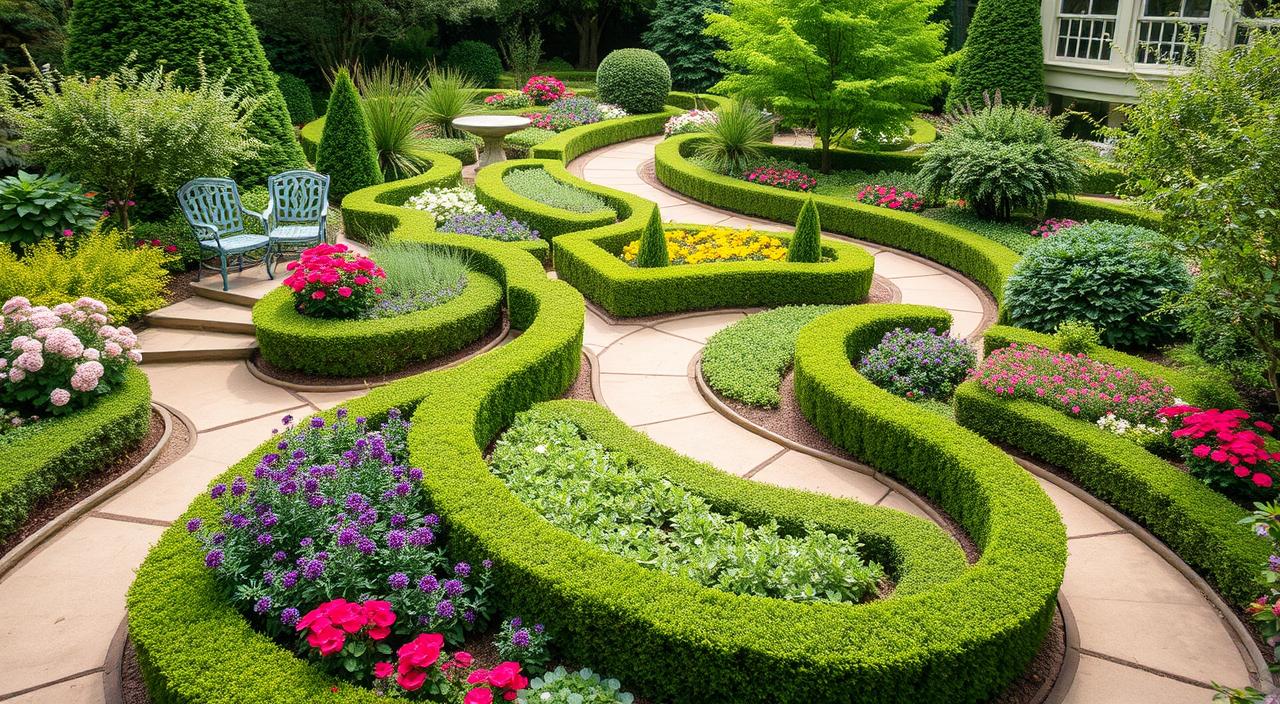
“The flow of energy, or ‘chi,’ is essential in Feng Shui. By incorporating curved elements into your garden design, you can encourage a smooth and harmonious flow of qi throughout the space.”
Feng Shui garden design aims to create a balanced space that supports your health. By following these tips, you can turn your garden into a peaceful oasis.
Add Seating for Prosperity and Relationships
Feng Shui teaches us to add lots of seating outside to help relationships and wealth grow. It’s wise to set up a cozy seating area with a round coffee table. This makes energy move better. A fire feature can also make people want to come together and talk.
Seating in a garden affects its energy and feel, Feng Shui says. Having enough seats for everyone to sit comfortably boosts socializing and bonds. A round coffee table also helps energy flow smoothly, bringing prosperity and happiness.
When making your feng shui seating arrangements, think about adding a fire feature. It makes your garden a welcoming place for people to gather. This way, your outdoor space becomes a place of community and deep connections.
“Incorporating seating areas with enough space for everyone to sit comfortably can improve relationships and encourage prosperity,” says Amy LaCentra, a renowned Feng Shui expert.
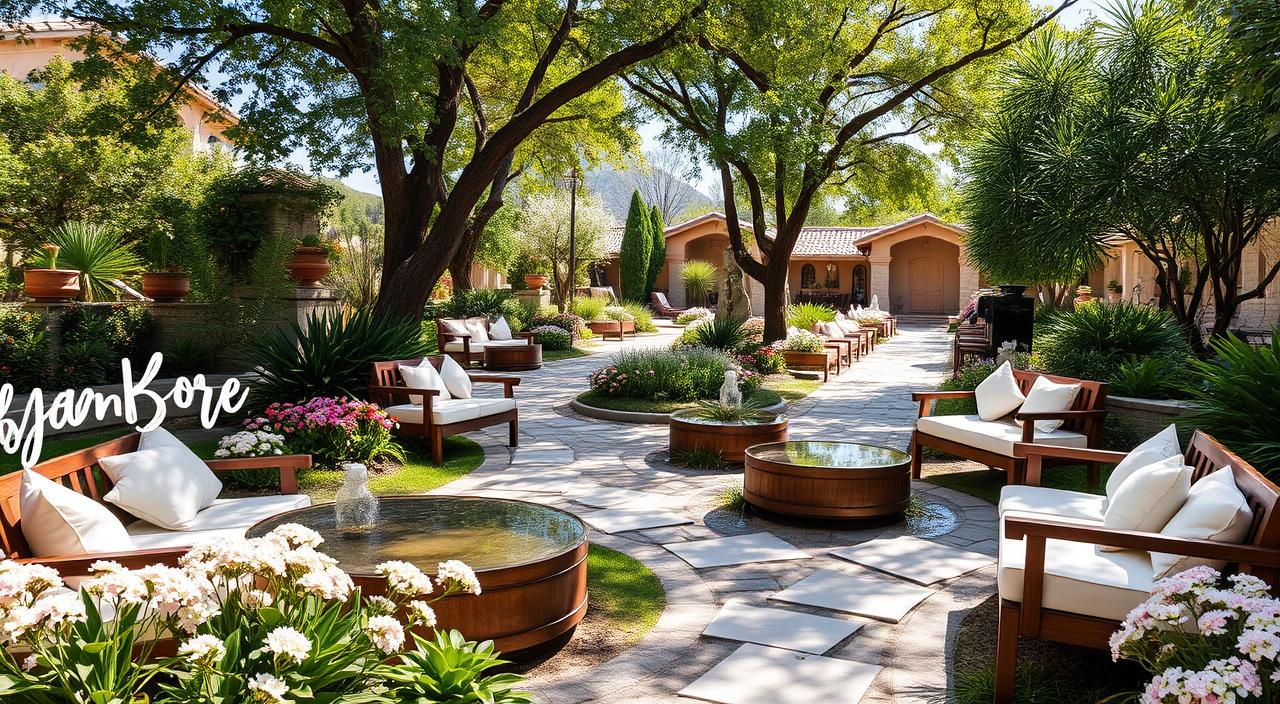
By carefully incorporating seating for prosperity and creating gathering spaces in gardens, you can make your outdoor area a place of joy and connection. It’s all about using Feng Shui to make your garden a haven for well-being and relationships.
Define Zones and Purpose for Your Garden
When designing a Feng Shui garden, it’s key to think about each zone’s purpose. Having areas for dining, relaxing, and play helps balance the energy. This makes your outdoor space cohesive and meaningful.
To zone garden spaces well, start by defining the purpose in feng shui gardens. Think about how you’ll use each part of your garden. Maybe you want a cozy spot for meals or a quiet area for meditation. By creating functional outdoor areas, you make a space that nourishes and rejuvenates.
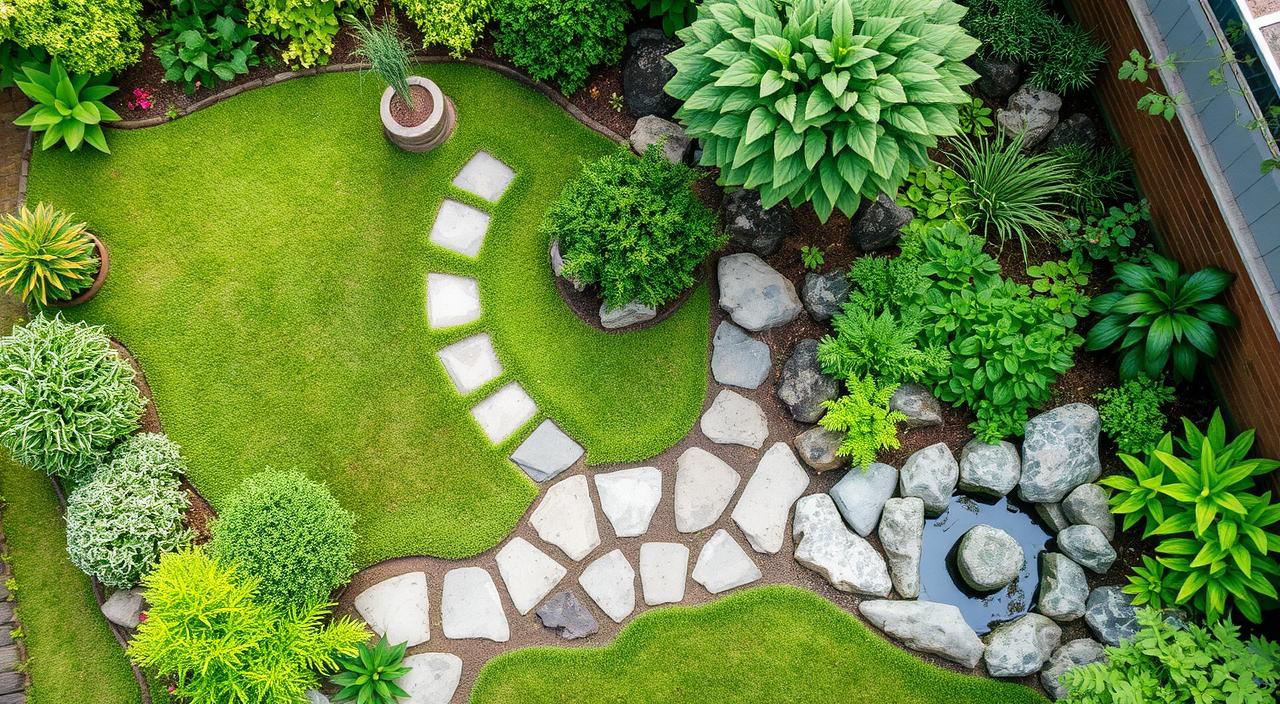
Each zone should have its own purpose to enhance your Feng Shui garden’s harmony. You might have a play area, a fragrant herb garden, or a calm pond. These spaces together create a balanced and purposeful outdoor space.
“The goal of Feng Shui in garden design is to create an inviting and calming space where individuals can thrive.”
By zoning your garden spaces, defining the purpose in feng shui gardens, and creating functional outdoor areas, you’re on the path to a harmonious outdoor sanctuary. This aligns with Feng Shui principles.
Feng Shui garden design, outdoor Feng Shui tips
Using feng shui can turn your garden into a peaceful oasis. This ancient Chinese art blends the five elements – water, wood, fire, earth, and metal. It aims to create a space of peace and well-being.
When designing your feng shui garden, use the Bagua map. It shows the eight key areas of life. Each area needs specific elements and colors to boost certain energies, like wealth or relationships.
- The north area, linked to career, needs calming blues and blacks.
- The east, for health and family, is best with green and brown wood elements.
- Wealth and recognition grow in the southeast and south with greenery and warm colors.
- The southwest, for relationships, loves yellows and comfy seating.
- The west, for kids and creativity, uses metallic whites, silvers, and golds.
- The northwest, for new starts and networking, prefers simple designs and social areas.
Outdoor feng shui tips also include cleaning up, adding water features, and ensuring easy movement. By following these tips, you can make a garden that refreshes the mind and body.
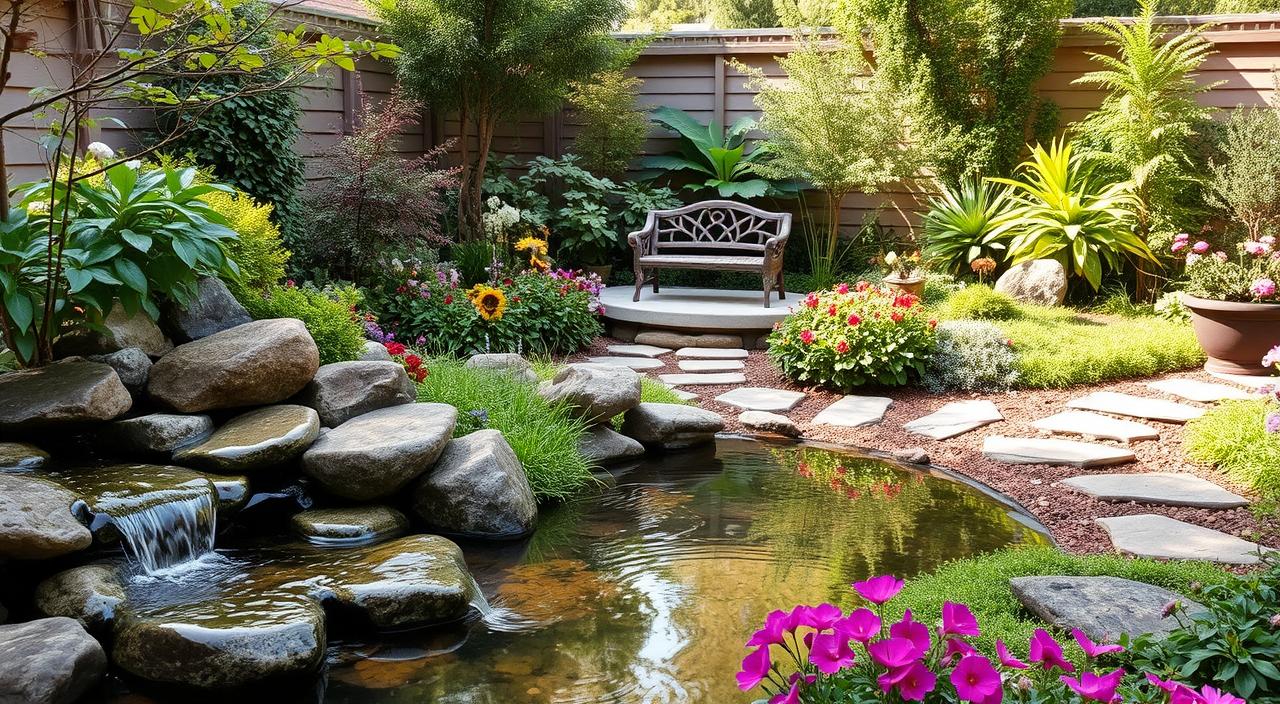
“Feng Shui is not just about the arrangement of furniture or objects – it’s about creating a harmonious flow of energy that nourishes the senses and the soul.”
Incorporate the Bagua Map
The Bagua map is a key tool in Feng Shui for your garden. It divides your space into nine areas, each for a different life aspect. These include wealth, relationships, career, and health.
By placing water features, plants, and other elements based on the Bagua map, you can improve energy flow. For example, a water feature in the southeast corner boosts wealth. Trees or bamboo in the east support growth and new starts.
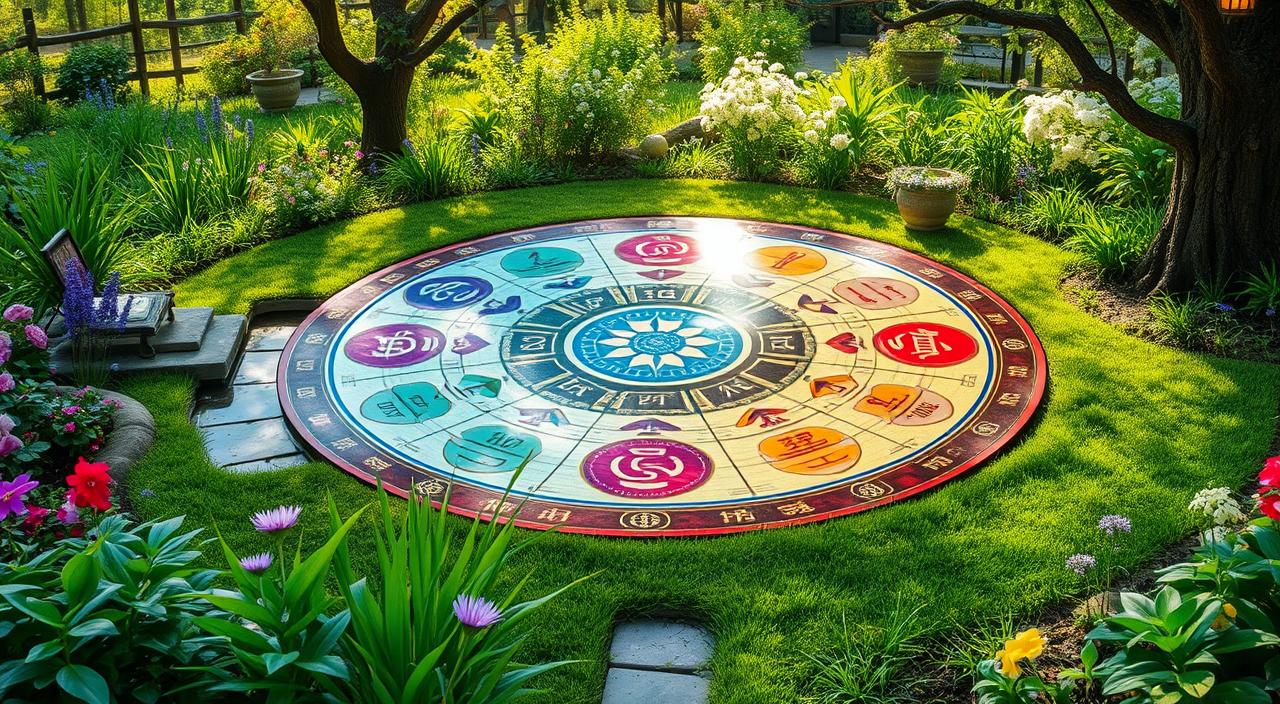
The Bagua map helps create a balanced garden that matches your goals. It’s great for improving prosperity, relationships, or finding peace. It guides you in using the bagua map in gardens and directing energy flow in gardens to get what you want.
Using the Bagua map in your feng shui bagua map outdoor design makes your garden beautiful and beneficial. It brings well-being and abundance to your outdoor space.
Balance the Five Elements
To make your outdoor space harmonious, balance the five Feng Shui elements is key. Use water features, plants, structures, and materials for each element. This way, you create a visually appealing and energetically balanced garden.
Feng Shui says each element affects different parts of life. Water is for career and growth, wood for family and wealth, fire for fame and passion, metal for children and beauty, and earth for health and stability.
To balance the five elements in your feng shui garden, consider these tips:
- Use water features like fountains or ponds for the water element. They help with career and wealth.
- Wooden structures, like fences or arbors, bring in the wood element. They support family and wealth.
- Fire-inspired elements, like fire pits or candles, represent fire. They boost fame and passion.
- Metal accessories, like wind chimes or sculptures, symbolize metal. They help with fertility, beauty, and children.
- Earth-based materials, like terracotta pots or stone pathways, represent earth. They promote health, partnerships, and stability.
By balancing the five elements in your outdoor space, you create a harmonious and beautiful environment. This environment supports overall well-being and positive energy flow.
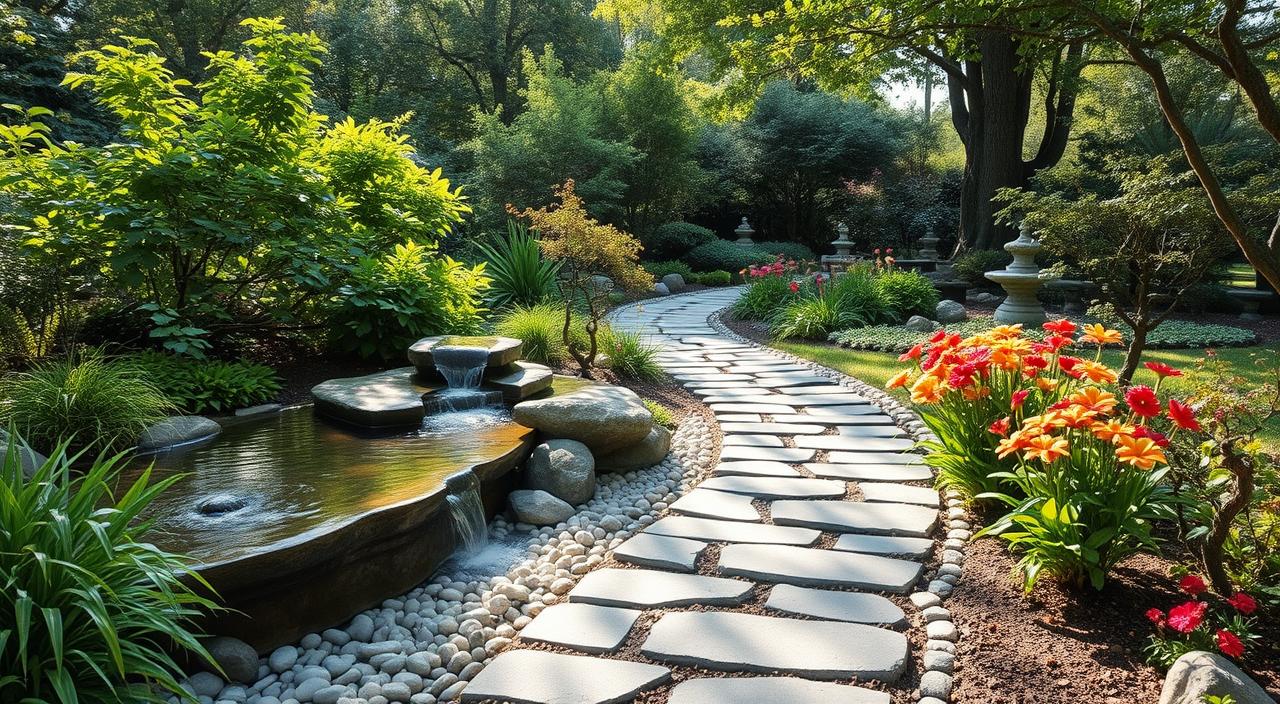
“Incorporating all five elements in your garden design is like creating a symphony of nature, where each element plays a vital role in achieving a state of equilibrium and harmony.” – Landscape Designer, Amy LaCentra
Remove Clutter and Embrace Natural Borders
Keeping your outdoor space clean and balanced is key in Feng Shui. Regularly clearing out dead plants and pathways helps. Using natural elements like hedges, stone walls, or bamboo fencing as borders can also improve the energy flow.
Landscape designer Kyle Aichele says, “Using natural materials and keeping the garden clean is essential for a peaceful outdoor space.” Aichele’s team focuses on maintaining clean outdoor spaces and using natural borders to support Feng Shui.
- Regularly remove dead plants, debris, and other distractions to keep the garden uncluttered.
- Incorporate natural borders, such as hedges, stone walls, or bamboo fencing, to define zones and enhance the flow of energy.
- Maintain clear pathways to encourage the smooth movement of qi (energy) throughout the garden.
By following these Feng Shui tips, you can make your outdoor space more appealing and peaceful. Decluttering gardens for Feng Shui and using natural borders in your design can help you achieve a calm and balanced environment.
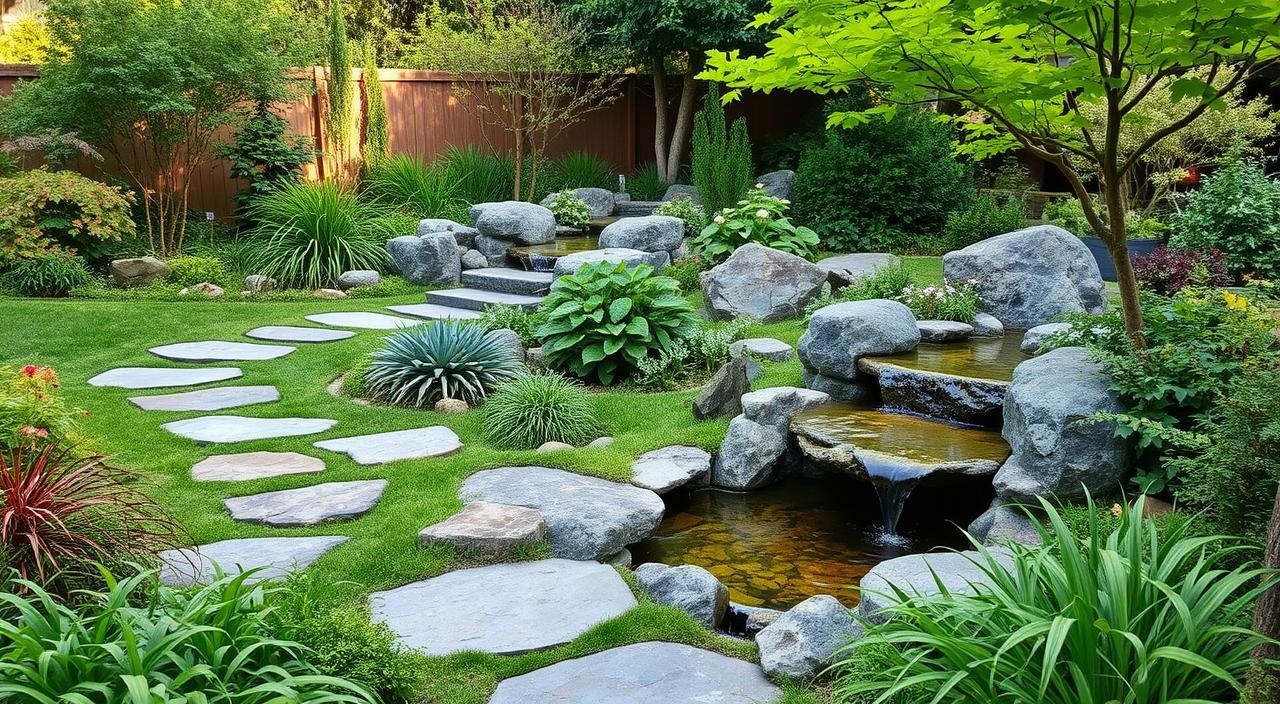
Consider the Flow from Your Door
In Feng Shui, linking your home and garden is key. A clear path from your doorways to the garden is vital for balance. Use water features, plants, or other points to guide energy smoothly between indoors and outdoors.
When designing your garden, focus on the energy flow from your doorways. Add elements to direct positive energy from your home to the garden. This might include:
- Placing a water feature, such as a fountain or a birdbath, near the entrance to your garden.
- Strategically positioning plants or garden structures to create harmonious transitions between your home and the outdoor space.
- Ensuring that the path from your door to the garden is clear and inviting, free of any obstructions that could disrupt the flow of energy.
By carefully planning the flow of energy from your home to your garden, you can create a seamless and harmonious outdoor space. This focus can greatly improve your home’s overall balance and tranquility.
“The connection between your home and garden is crucial in Feng Shui. Strategically placing water features, plants, or other focal points can help guide the energy flow and create a seamless transition between your indoor and outdoor living spaces.”
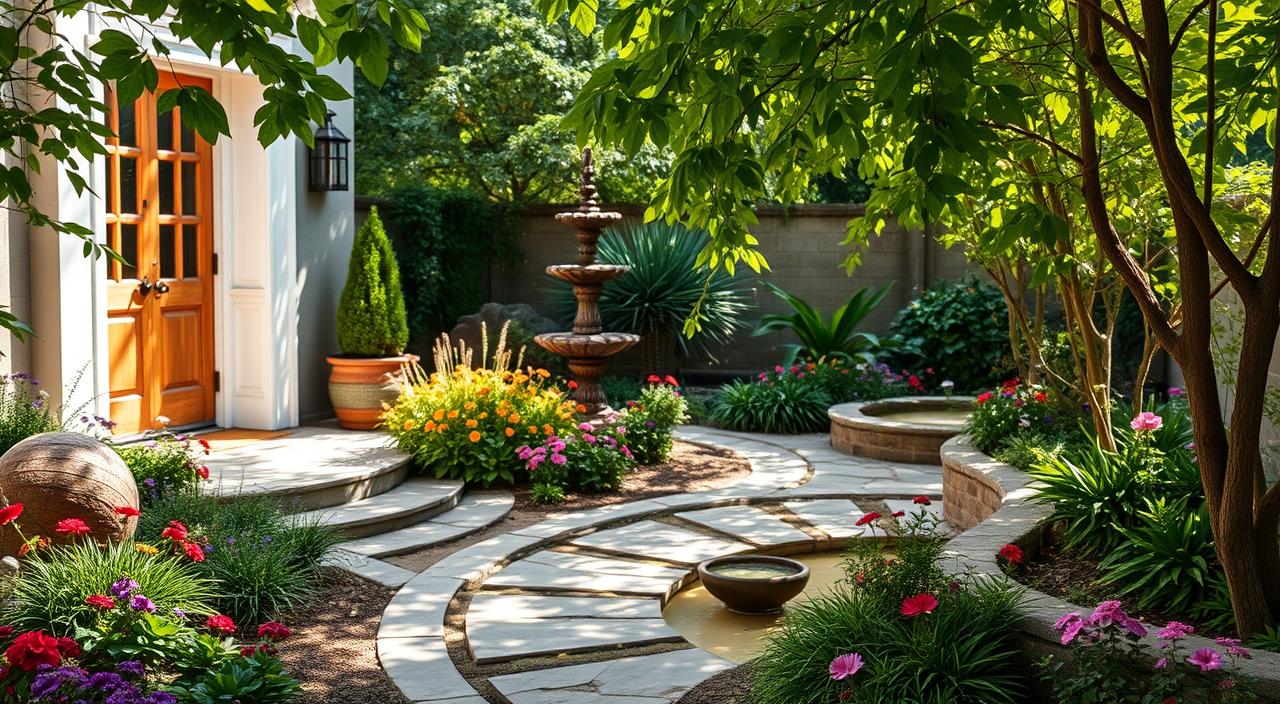
Create Focal Points and Direct Energy
In Feng Shui, using focal points in your garden is key. They help direct energy and add beauty. These points guide the eye and move chi, or life force, in your outdoor space.
Choose focal points that bring calm and peace. Sculptures, water features, or big plants can help balance your garden’s Feng Shui. By picking these elements wisely, you make your garden more welcoming and refreshing.
- Strategically place focal points to guide the flow of energy throughout your garden.
- Incorporate elements like sculptures, water features, or striking plants to draw the eye and create visual interest.
- Ensure that the positioning of your focal points aligns with Feng Shui principles to promote a sense of balance and tranquility.
By using feng shui focal points in gardens, you can make your outdoor area peaceful and refreshing. Whether it’s a calm water feature or a stunning sculpture, placing these elements right can direct energy flow with garden features and create visual interest in outdoor spaces. This improves your garden’s Feng Shui.
Curate Color Schemes for Positive Energy
Feng shui is an ancient Chinese art that focuses on harmonizing spaces. It uses color to bring balance and calm to your garden. By using shades that represent the five elements, you can create positive energy and improve your garden’s look.
Experts suggest using blues, blacks, and greens to bring calm from the water element. These cool colors help reduce stress and bring peace. Add vibrant reds, oranges, and purples to bring warmth and creativity from the fire element.
To make your garden feel grounded, use earthy yellows, browns, and neutrals from the earth element. Finally, include metallic hues for strength and purity from the metal element. This helps improve the energy flow.
By choosing the right feng shui color schemes for gardens, you can make your outdoor space beautiful. It also brings positive energy and enhanced well-being to everyone who visits.
“The right colors can transform a garden into a tranquil oasis, where the mind and body can find harmony and rejuvenation.”
Conclusion
By using Feng Shui in your garden, you can make a peaceful outdoor space. This space helps you relax, improves relationships, and boosts your health. To create this sanctuary, arrange the five elements of Feng Shui wisely. Choose colors that bring good energy and keep your space clean to flow with life force.
Feng Shui can turn your garden into a refreshing retreat. It nourishes your mind, body, and spirit. With careful placement of water and plants, your garden becomes balanced and harmonious. This balance connects you with nature and makes your outdoor time better.
Any outdoor space can benefit from Feng Shui. It doesn’t matter if you have a big backyard or a small patio. Feng Shui unlocks your space’s potential. It creates a peaceful area filled with positive energy, helping you relax, connect with others, and feel well.
Enhance Your Life with Feng Shui Jewelry
Bring balance and positive energy into your life with Feng Shui Jewelry. Our carefully crafted pieces are designed to enhance your well-being and attract harmony. Want to experience the benefits for yourself? Click here to explore our collection and find your perfect piece.
FAQ
What is Feng Shui and how does it apply to garden design?
Feng Shui is an ancient Chinese practice. It aims to create harmony between people and their environment. It focuses on balancing the five elements – water, wood, fire, earth, and metal – to promote positive energy flow.
By incorporating these elements in your garden, you can achieve Feng Shui principles. This creates a harmonious outdoor space.
How can I avoid sharp corners in my garden design?
Feng Shui advises against sharp corners, as they channel negative energy. Use curved features like garden paths and flower beds to create a calming atmosphere.
Curved elements help the energy flow smoothly through your outdoor space.
Why is it important to include ample seating in a Feng Shui garden?
Feng Shui emphasizes the importance of ample seating in outdoor spaces. It fosters relationships and promotes prosperity. Experts suggest creating a seating area with a round outdoor coffee table.
This helps the energy flow smoothly. Adding a focal point, like a fire feature, invites people to gather and connect.
How should I define the zones and purpose of my garden in Feng Shui?
When designing a Feng Shui garden, consider the purpose of different zones. Establish areas for dining, relaxation, and play to balance the energy flow.
This approach creates a cohesive and purposeful outdoor environment.
How can I use the Bagua map to guide my Feng Shui garden design?
The Bagua map is a key tool in Feng Shui. It guides the placement of elements and features in your garden. By overlaying the Bagua map on your space, you can strategically position water features, plants, and objects.
This harnesses positive energy flow and promotes specific outcomes, like wealth and relationships.
How do I balance the five Feng Shui elements in my garden?
Balancing the five Feng Shui elements – water, wood, fire, earth, and metal – is crucial. This can be done by strategically placing water features, vegetation, structures, and materials that represent each element.
By incorporating all five elements, you create a visually appealing and energetically balanced garden.
How can I keep my garden clutter-free and enhance the flow of energy?
Feng Shui emphasizes keeping outdoor spaces clutter-free and distraction-free. Regularly remove dead plants and maintain clear pathways.
Incorporate natural borders, like hedges or stone walls, to improve energy flow and create tranquility. Using natural elements for boundaries grounds the space and enhances Feng Shui.
How do I create a seamless connection between my home and garden in Feng Shui?
The connection between your home and garden is key in Feng Shui. Ensure a clear and unobstructed flow of energy from doorways to outdoor spaces.
Strategically place water features, plants, or other focal points to guide energy flow. This creates a seamless transition between indoor and outdoor living spaces.
What role do focal points play in Feng Shui garden design?
Focal points, like sculptures or water features, direct the flow of energy in your Feng Shui garden. They serve as visual anchors that guide the eye and influence chi flow.
Carefully position these focal points to enhance the overall harmony and balance of your outdoor oasis.
How can I use color to enhance the Feng Shui of my garden?
Color is crucial in Feng Shui, including your garden design. Select colors that represent the five elements (water, wood, fire, earth, and metal) to foster positive energy.
Experts suggest using shades of blue, black, green, red, and metallic hues. This balances different energies and promotes serenity and prosperity.












